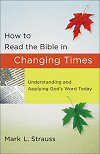Logos recently released a 4 volume collection on How to Read the Bible. The four volumes are:
- All That Jesus Asks: How His Questions Can Teach and Transform Us by Stan Guthrie
- A Concise Guide to Bible Prophecy: 60 Predictions Everyone Should Know by Stan Guthrie
- How to Read the Bible in Changing Times: Understanding and Applying God’s Word Today by Mark L. Strauss
- Out of Context: How to Avoid Misinterpreting the Bible by Richard L. Schultz
 Part 1: How to Read the Bible in Changing Times by Strauss
Part 1: How to Read the Bible in Changing Times by Strauss
I have taught several classes on how to read the Bible for both new and seasoned Christians and this book has just about everything I have ever included in those studies. This book is very similar to Gordon Fee’s book How to Read the Bible for All It’s Worth (Strauss actually co-wrote “How to Choose a Translation for All It’s Worth” with Fee). The big difference is Stuart’s book covers more ground than Fee & Stuart by spending less time on genre (giving it a thorough overview with the essentials) and more time on how to make sense of what the Bible is and how to read it in light of our own cultural assumptions and biases. The book is also written from a pretty conservative perspective, which I appreciate. Strauss has a great deal of respect for the biblical text and sees it as an authority in the life of the Christian. I also appreciate that he has taught how to read the Bible on multiple occasions within Bible classes. That takes some of the ivory tower out of his approach and results in him asking and addressing the questions real people ask.
The two main things I liked about Strauss’ work is that he is extremely talented at asking good, guiding questions and his examples are extremely helpful. Instead of just giving you information, he often gives you the right questions to ask while studying a text and the order in which to ask them. That is tremendously helpful. This book is also loaded with biblical examples where he takes scripture and runs them through the questions he would have you ask of the text. Again, that is extremely helpful. Each chapter ends with discussion questions, complete with blanks to type in your answers. The questions have two purposes: 1) review the principles to help you remember them and 2) to help you figure out which parts you might actually use.
This book is a little more advanced than just an introductory text on how to read the Bible. I think it would be good for a new Christian or an experienced/older Christian to read but young Christians will have a lot of questions (especially in the later chapters) that they will need help with as they work through this book. That is not a bad thing, just saying that for your own awareness. I would hope a new Christian would already have someone more mature they could ask those questions to.
Overall, great book and one that I would recommend, especially for someone who is a little more than just getting started. I would recommend this book as a leader guide for a more experienced Christian who is teaching a class on how to read the Bible. This would be my primary text for a class like that.
There was one thing I wish they would change in the book. There is a list of additional resources on page 221 that is hidden in the text. It would have been better to have formatted this as a list of additional resources so you could find it easier. Honestly, this book needed an Appendix of additional resources. There are so many great resources out there on how to read the Bible contextually, how to understand culture, exegesis, how to read prophesy, and even commentaries that are geared toward reading the Bible from a historical perspective (like Beale’s work) that really needed to be listed at the end of the book. That would be a great addition to get the recommendations on these works from a person of Strauss’ caliber.
The 4 Volume collection is $47.18 @ Logos.com which is really a great deal to get four books (with no shipping cost) straight to your computer, with all the bells and whistles that come with Logos’ products (fully searchable, indexed and linked in with other resources, etc).








One Response
In addition to concerns about morality, inerrancy, or historicity, there remain some questions of which books should be included in the Bible (see canon of scripture ). Jews discount the New Testament , most Christians deny the legitimacy of the New Testament apocrypha , and a view sometimes referred to as Jesusism does not affirm the scriptural authority of any biblical text other than the teachings of Jesus in the Gospels.